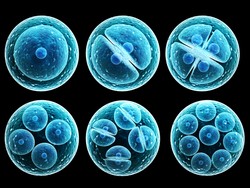Biochemical insight into cell division
Cell division is an essential biological process that requires the concerted action of many regulators. The last step known as cytokinesis involves the equal sorting of cellular components between the daughter cells, and membrane ingression and closure. Both processes rely heavily on membrane components and properties, with membrane transport being required to relieve cortical tension during the physical separation of cells. However, the precise mechanism of membrane rearrangement remains unknown. The primary objective of the EU-funded CHEMMEM (A chemical approach to understanding the role of membranes and membrane transport in cell division) project was to investigate the role of membrane lipids in cell division. Using mass spectrometry, they analysed the lipidome changes in dividing cells and found that only certain lipids with specific side chains accumulated at the division site. Atomic force microscopy helped researchers analyse the mechanical properties of lipids in dividing cells and identify the lipid biosynthetic enzymes involved in division. Functional insight indicated that, during cell division, membrane lipids had structural roles and were also involved in signal transmission. Transport of lipids and proteins in the division machinery occurred through membrane trafficking. Intriguingly, scientists discovered that the G-protein coupled dopamine receptor D3 regulated endocytic sorting and that the clinically used drug Prazosin served as an inhibitor of endocytic sorting and cytokinesis. Although the precise mechanism warrants further investigation, the finding underscores the complexity of cell division. Collectively, the findings of the CHEMMEM study enhanced our understanding of cell division and unveiled a new role for membrane lipids. This information will help scientists comprehend how cell division is deregulated in diseases such as cancer and drive the development of novel interventions.







